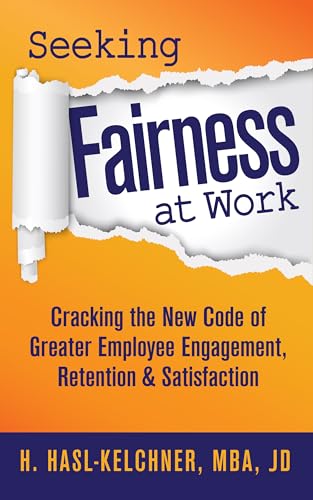Interview with Hanna Hasl-Kelchner, Author of Seeking Fairness at Work
14 Aug 2024
What’s the story behind the story? What inspired you to write Seeking Fairness at Work: Cracking the New Code of Greater Employee Engagement, Retention & Satisfaction?
Unlike other books about management and leadership, I wanted to honor the worker perspective on low employee engagement while also offering a more comprehensive, yet practical, framework executives, managers, and business owners could use to address engagement, retention, and employee satisfaction issues. Over the years, as a business strategist and attorney, frustrated employees shared their feelings of helplessness and anger with me many times about their organization’s willful blindness to management behaviors that torched their dignity, confidence, and psychological safety. I’ve witnessed the transformation of enthusiastic new hires into zombie employees reluctant to raise their hands out of fear of retaliation. And I’ve also seen how low employee engagement is a persistently stubborn problem globally.
According to Gallup’s annual State of the Workplace surveys employee engagement rates fluctuate from year-to-year in the 30-something percent range. It means 70-something percent of employees were disengaged to some degree. That’s huge. If you were still in school and had only 30-something correct answers on a test you’d receive a failing grade. Management can do better. Since employees are never more gung-ho about work than on their first day at a new job, it occurred to me that phrasing the problem as “employee engagement” puts the onus on employees to shape up when in reality diminished engagement is a reaction to management’s use of power in the workplace.
As adults, we’ve been conditioned to believe that just because life isn’t fair the workplace doesn’t need to be fair either. That’s a myth. Fairness at work isn’t charity. It’s smart business. Think for a moment about trust. How much can you trust an individual or organization that isn’t fair? Exactly. Fairness matters in multiple ways.
If you had to pick theme songs for the main characters of Seeking Fairness at Work: Cracking the New Code of Greater Employee Engagement, Retention & Satisfaction, what would they be?
The theme from Mission Impossible.
What’s your favorite genre to read? Is it the same as your favorite genre to write?
Nonfiction business books.
What books are on your TBR pile right now?
The upcoming 3rd edition of Help Them Grow, or Watch Them Go: Career Conversations Organizations Need and Employees Still Want.
What scene in your book was your favorite to write?
Chapter 3: How Power Changes Everything was my favorite chapter to write.
Do you have any quirky writing habits? (lucky mugs, cats on laps, etc.)
I find inspiration to be the most difficult thing to schedule. I’ve been known to fire up my computer at 3 or 4 a.m. if an idea wakes me up, and then crawl back to bed once it’s saved.
Do you have a motto, quote, or philosophy you live by?
As Einstein once said, “We cannot solve problems with the same thinking we used when we created them.”
If you could choose one thing for readers to remember after reading your book, what would it be?
With more fairness at work, everyone wins.
Hanna Hasl-Kelchner, MBA, JD is the author of the new book Seeking Fairness at Work: Cracking the New Code of Greater Employee Engagement, Retention & Satisfaction
Connect with Hanna Hasl-Kelchner, MBA, JD
Author Site
Sign up for our email and we’ll send you the best new books in your favorite genres weekly.
Related
kali
Recommended Posts

Interview with Michelle Whetsell, Author of Verwaist aus Missbrauch
24 Dec 2024 - Author Interviews, eBook, News

New Mystery and Thriller Books to Read | December 24
24 Dec 2024 - eBook, Mystery, News, Thriller, Weekly Releases

New Romance Books to Read | December 24
24 Dec 2024 - eBook, News, Romance, Weekly Releases
